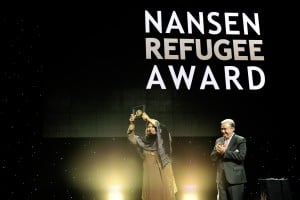News Stories, 5 October 2015

Aqeela Asifi made it her mission over more than 20 years in exile to bring education to refugee girls in Pakistan. © UNHCR/M Henley
GENEVA, Oct 5 (UNHCR) – The courageous work of an Afghan refugee teacher took centre stage Monday night as Aqeela Asifi was presented with the 2015 Nansen Refugee Award by UN High Commissioner for Refugees, António Guterres.
In an extraordinary story of bravery and determination against all odds, Aqeela Asifi made it her mission over more than 20 years in exile to bring education to refugee girls in a remote community in Pakistan.
Asifi has been recognised for her brave and tireless dedication to education for Afghan refugee girls in the Kot Chandana refugee village in Mianwali, Pakistan – while herself overcoming the struggles of life in exile.
Despite minimal resources and significant cultural challenges, Asifi has guided a thousand refugee girls through their primary education. Upon receiving the award Asifi spoke of her life’s mission.
“When I first set up my school I was not very optimistic. This success is beyond my expectations. Let the dove of peace be our messenger, let us shun the culture of war and weapons and let us promote the culture of pen and education. That’s the only way, my dear brothers and sisters, that we can bring peace and prosperity to our country.”
The UN High Commissioner for Refugees, António Guterres paid tribute to her efforts: “The role a teacher plays in a child’s life can be transformative. In Aqeela Asifi’s case, it has been profound. She has given hundreds of young girls the chance to dream of a better future.”
Asifi fled from Kabul with her family in 1992, finding safety in the remote refugee settlement of Kot Chandana. Asifi was dismayed by the lack of schooling for girls there. Before she arrived, strict cultural traditions kept most girls at home.
But she was determined to give these girls a chance to learn. Slowly but surely she convinced the community, and began teaching just a handful of pupils in a makeshift school tent. She copied out worksheets for the students by hand on sheets of paper.
Today the tent school is a distant memory and over a thousand children are attending permanent schools in the village thanks to her early example.
Afghanistan is the largest, most protracted refugee crisis in the world. Over 2.6 million Afghans currently live in exile and over half of them are children. Access to education is vital for successful repatriation, resettlement or local integration for refugees. Yet globally it’s estimated that only one in every two refugee children are able to go to primary school and only one in four attend secondary school. And for Afghan refugees in Pakistan this falls further, with approximately 80 per cent of children currently out of school.
For 61 years, the Nansen Refugee Award has recognised those who have shown outstanding dedication to the refugee cause. It not only names Eleanor Roosevelt, Graça Machel and Luciano Pavarotti among its laureates, but a number of remarkable unsung heroes, such as Aqeela Asifi, who have dedicated themselves to fighting the injustices suffered by the forcibly displaced.
As a staunch advocate for refugee children’s education, UNHCR Regional Goodwill Ambassador Ger Duany spoke from first-hand experience about the importance of education in a refugee child’s life.
“Humanity is rallying to finally recognize that assisting refugees is not a choice. It is a collective responsibility. The heroism of Aqeela Asifi embodies that same sense of responsibility,” said Duany.
“The day I graduated I realized there was much more to me than I had ever seen in myself. In that moment I started to become hopeful for the future. This is the gift Aqeela Asifi has given her students,” he added.
The Award ceremony, in Geneva’s Bâtiment des Forces Motrices, featured performances from UNICEF Goodwill Ambassador and two-time Grammy winner, Angelique Kidjo, and UNHCR Honorary Lifetime Goodwill Ambassador, Barbara Hendricks.
Hendrix praised the Nansen winner, telling her: “You have inspired us all…Your girls will show the world that what you’re doing is exactly the right thing.” Reflecting upon the resilience of refugee children, Hendricks said: “This year I am especially proud to be here because I know from personal experience that education is an important key to open the doors for a better life for all children but especially for refugees and girls in particular.”
Kidjo recognised the importance of education for refugee children: “We all shape our knowledge and experiences to our own strengths and interests possible.”
Swiss visual artist Cedric Cassimo illustrated Asifi’s story in a series of images drawn in sand. About the Nansen Refugee Award: The Nansen Refugee Award is named after Fridtjof Nansen, the famous Norwegian polar explorer, humanitarian and Nobel Peace Prize laureate who served as the first High Commissioner for Refugees for the League of Nations. Nansen was a constant and vital supporter of the refugee cause in a time before UNHCR existed.
Share on Facebook Share on Twitter